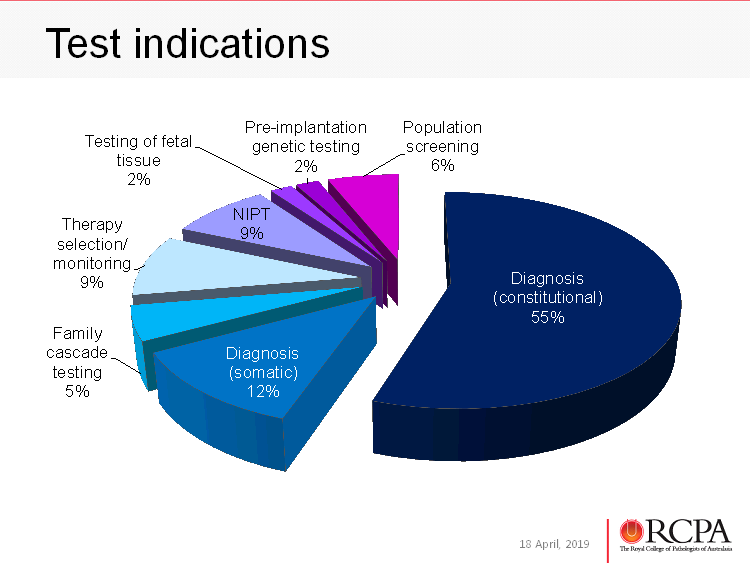The post From science fiction to science fact: the rise and rise of genetic testing first appeared on Know Pathology Know Healthcare.
]]>Genetic testing refers to specific genes or parts of genes and how those characteristics are passed through generations via DNA. Genomics refers to the entirety of an organism’s genes and analysing vast amounts of DNA data to find variations that impact health, disease, or drug response. Genomics in medicine can also refer to testing all the genes known to be related to a specific disorder e.g. all the genes known to cause intellectual disability or breast cancer.
The report found a 73% increase in molecular test requests over the past 5 ½ years, with more than 660,000 genetic or genomic tests reported during the 2016/2017 financial year.
More than 660,000 genetic/genomic tests were reported over the one-year survey period, which ran during the 2016/2017 financial year.
The field of genetics/genomics is exploring exciting new areas, such as pharmacogenetics – which allows a clinician to look at an individual’s genetic make-up and metabolism in order to prescribe the ideal drug and dosage.
People had genetic tests for a number of reasons, including cancer diagnosis and treatment, looking for inheritable genetic conditions, transplant monitoring, and prenatal screening.
It is also possible through genetic testing to determine which patients will and which won’t respond to a medicine, helping refine and personalise the treatment and to save significant amounts of money on expensive medicines that may not work.
Dr Melody Caramins, a genetic pathologist, explains that the developments in genetic medicine are both a boon to the healthcare sector and a challenge.

While promising a radical improvement in the way we treat patients, the genetics/genomics revolution is also presenting challenges to the medical field.
‘The development of genetic technology has been swift but because it’s moving so rapidly there’s a risk of clinicians not being up to date.
‘That puts a premium on the medical and pathology workforce to help upskill requesting doctors and to integrate these technologies into mainstream healthcare, because the benefits of using these tests responsibly can potentially be enormous.’
The RCPA data shows that GPs were the most frequent users of genomic testing, along with obstetricians, fertility, and foetal medicine specialists: this grouping was responsible for ordering half of the genetic and genomic tests conducted over the last 12 months.
Another way in which genetic/genomic testing is throwing forward challenges is in their funding, although that too has increased in recent years.
‘In 2011, Medicare funding covered about 35% of genetic tests. In the 2016/2017 period that figure rose to 49% of tests being covered by Medicare,’ said Dr Caramins.
‘That increase reflects both the increase in the number of tests being taken as well as the increase in the variety of tests being covered by the Medicare Benefit Schedule.’
The post From science fiction to science fact: the rise and rise of genetic testing first appeared on Know Pathology Know Healthcare.
]]>The post The drugs don’t work: how precision medicine can help treat patients first appeared on Know Pathology Know Healthcare.
]]>That’s a problem that genetic pathologists are trying to remedy through individualised medicine: looking at an individual’s genetic and metabolic makeup to work out the best course of treatment for an individual.
According to a report published in the March edition of the Australian Journal of General Practice, a person’s genetic makeup and metabolism impacts the way people respond to medication, which can result in insufficient dosage or adverse drug reactions in many cases.
The relationship between genes and how your body processes medication is called pharmacogenomics – a branch of genetic pathology that allows a person to be tested to determine the most effective medicine and the best dosage.

One of the paper’s authors, genetic pathologist, Professor Graeme Suthers, explains how pharmacogenomics could help improve the prescription of medicines.
‘Approximately 96% of the population has what are called “pharmacogenetic* variants” that can slow down or accelerate the breakdown of common medications in the body.
‘A pharmacogenomic variant can affect how a medication is absorbed from the gut, distributed in the body, broken down, and excreted by an individual.
’We recently examined data of about 30 medications from the Pharmaceutical Benefits Scheme and found that 1.7 million Australians take medications that are influenced by pharmacogenomic variants, and that 40% of them would be expected to have pharmacogenomic variants relevant for that medication.’
This genetic variation helps explain the difficulty experienced by some in finding the right medication for depression and other mental illnesses.
But thankfully, science has developed genetic tests that can help determine the right course of medication for a patient.
Patients can now have what’s called a pharmacogenomic test (PGX) that helps a clinician to understand an individual’s makeup and to prescribe the right drug at the right dose.
There are two genes primarily responsible for the metabolism of many antidepressants, and by understanding through a PGX test how these genes are working in individual patients, the treatment course can be individualised for optimal effect.
This idea of getting a genetic read of an individual to tailor medicine sounds like an approach from the future but has in fact been around for 50 years. But it is only now that pathologists know enough about combinations of drugs and genes that this type of testing is becoming “mainstream”.
‘Pharmacogenomics has taken hold in Europe and America, but in Australia at the moment we’re a little behind on education, regulation, rebates and national guidelines,’ said Professor Suthers.
‘Now is the time for clinicians, pathologists, educators, and regulators to work together to develop the guidelines and resources to ensure that Australian patients benefit from the responsible use of pharmacogenomics in daily practice.’
* pharmacogenetics usually refers to how variation in one single gene influences the response to a single drug. Pharmacogenomics is a broader term, which studies how all of the genes (the genome) can influence responses to drugs.
The post The drugs don’t work: how precision medicine can help treat patients first appeared on Know Pathology Know Healthcare.
]]>